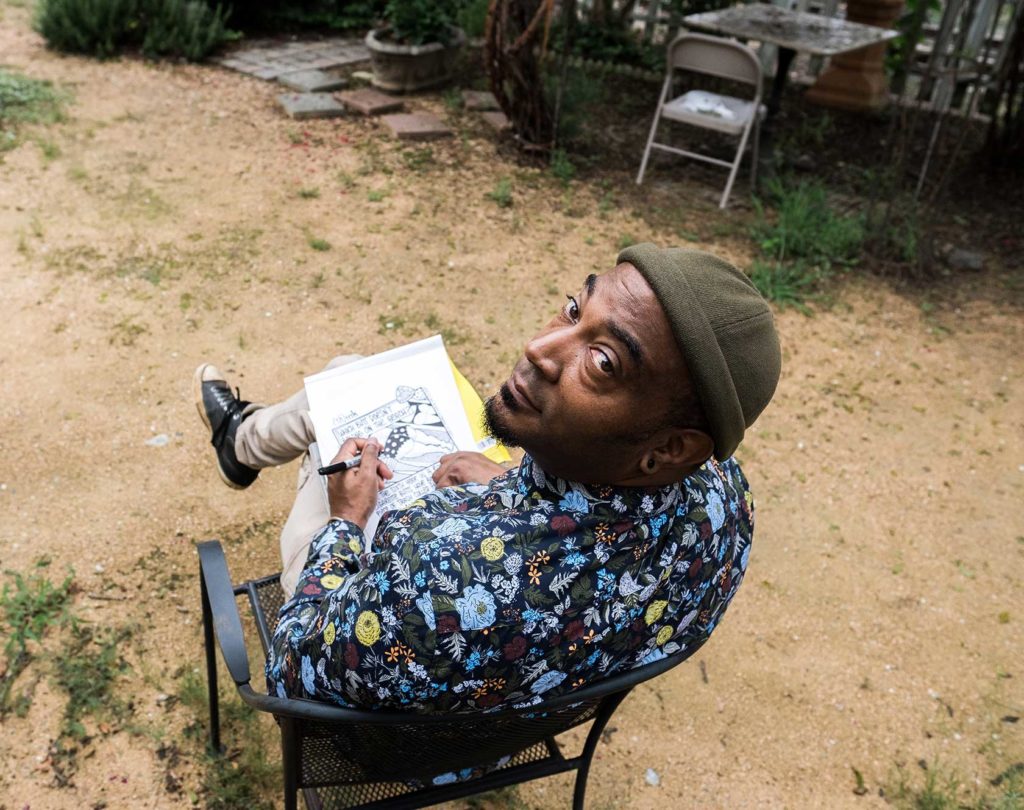
Cartoonist and Malden native Keith Knight, whose semi-autobiographical series, “Woke,” is airing its second season on Hulu, has been tapped to deliver the graduation address at his alma mater, Salem State University on May 19. Knight has authored and illustrated 19 books and cut three albums with the hip-hop band Marginal Prophets.
In his syndicated cartoon, “The K Chronicles,” Knight riffs off his experiences with friends and strangers in San Francisco, where he lived from 1993 until 2007. He’s currently co-writer for “Woke” and lives in North Carolina.
The Banner caught up with Knight last week. The following interview has been edited for clarity and brevity.
How did growing up in Malden inform your sense of humor?
I think it’s an East Coast sensibility, or Northeast sensibility. You rip on people, you rip on yourself. I think it’s a sign of affection almost. But I also gotta say that the education that I got in the public schools and also at my college really informed my sensibilities.
How did you first get into drawing comics?
I always did comics, but the first time I did autobiographical comics was in junior high school. I started drawing stuff about what happened to me and my friends. The first comic I did, I think it was about a food fight in the cafeteria. And what I noticed was, I make fun of everybody in my comics. I thought they were going to beat me up. But they were actually really excited to be in the comic and I was like, ‘OK, so you really don’t want to kick my ass. This is great.’
Your humor oftentimes takes on racism head on. Do you think that white people can learn something from your strips, and do you think that’s even the point?
I think everybody can learn from you sharing your story. This is what I tell everybody who’s starting out in any sort of any in comics or in television or music. Tell your story, whether it’s through comics, or poetry or any sort of writing or music. No one’s going to tell your story better than you can. If you tell your genuine story, people who you think are not similar to you are going find some of themselves in that story.
What I love about season two [of “Woke”] dropping is, we’re going to promote it. Season one came out during the pandemic, so we never got to get any feedback. We just did the WonderCon Comics Festival in Anaheim, and I had a guy come up to me who totally saw himself as the lead character of the show — and he was a Latino immigrant. He was undocumented, and his paranoia of any sort of authority, police and all that, like, it really affected him in a in a very deep way. And it was just great to hear this professor from the University of Tennessee talk about how he uses the show in his classroom. Just hearing people’s stories, it meant a lot, and it just reinforces when people say if you tell your story, tell your truth, it will resonate far and wide.
‘Woke’ depicts an incident in which you were stopped by police while stapling fliers to utility poles. Was that the first time you were stopped by police?
It happened to me growing up in Boston with my friends, coming back from the clubs, you know, but never where I’m just randomly just putting up posters. That definitely was a very thin pretext. But what made it really dangerous is that the stapler I had was black, and tons more people have died for holding stuff that looks less like a gun. So the first thing I remember doing is holding up my stapler: ‘This is the stapler. I’m going to put it down.’ I just didn’t want any excuse for them to pull their guns on me. I’m not saying I ever expected it to come, but you know, I was able to act very calm in that situation, so it’s almost like I was prepared for it.
When it was happening, Were you thinking, ‘I’m going to write about this’?
Totally! I’m sure you feel that as a journalist too. I remember sitting on the curb. I’m so used to being the one checking out the incident and trying to catch the eye of whoever’s being hassled at that time. I said, ‘I’m going to look at everybody who comes by,’ and it was amazing how frightened some people were when I caught their eye. Like, just trying to stare at that. And yeah, I just observed everything. I observed the cops coming from three different angles down different streets. You know, totally speeding, lights flashing. And there was one cop that showed up that is from my neighborhood, and he got out and saw me and just nodded his head. And, you know, he’s the one who apologized to me profusely to me and gave me a ride.
The most real part from the real incident in the show was when my white roommate got off of a bus and came running after police screaming bloody hell, and the cops all turned around and treated him like he was the manager. There he was, up in their faces, and they were almost like ‘Yes, sir.’ I was shocked by that. I’m shocked at what white people can get away with when dealing with police officers.
What message will you bring to the Salem State graduates in your speech?
I think the biggest thing I want them to take away is, don’t be afraid to fail. Do not hesitate in going for what you want to be or want to do in life because you might fail. The failure is in not going for it, not trying because you’re afraid to fail. There is so much to learn if things don’t work out.







